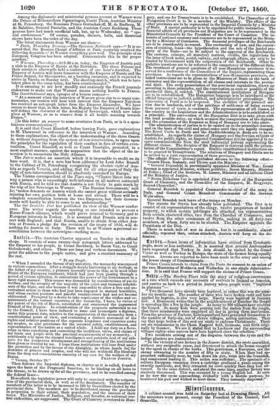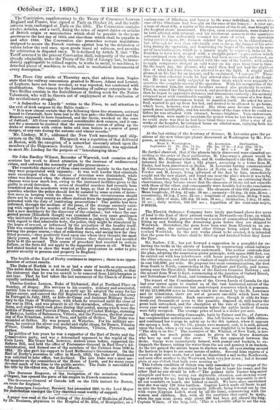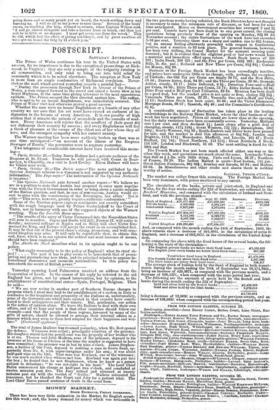--
thA cabinet council was held on Saturdirilimi*t., Altileeete ..431
e ministers were present, except the President of the uncil; Earl Granville.
,
The Convention, supplementary to the Treaty of Commerce between Englau'l and Vranae, was ,signed at Faris on October I2, and the ratUl- coitions. were exchanged at l'ana on the;25th. The Convention contains twelve Articles, end a tariff, fixing the rates of import duties on articles of British engiut or manufacture which. shall be payable in the years previourrto the last day of 1663, and also those which shall be payable in and after 1864. The Convention also prescribes certain regulations designed to secure the French customs against loss by the delaration of values below the real ones; upon goods taxed ad valorem, and provides for arbitration in disputed cases. It is declared by Article X. that "The Tariff annexed to the present Convention shall, indecently of the articles olready admiasible under tbe Treaty of the 23d of Jenuery last, be imme- diately applieripable to refined sugars, to works in metal to machines, to detached pieces of machines, to tools, and to mechanical instruments of every description."
The Times City article of Thursday says, that advices from Naples state that the railway concessions granted to Messrs. Adami and Lemmi, of Leghorn, have not been revoked; as was reported, but confirmed with modifications. One reason for the hastening of railway-enterprise in the Two Sicilies consists in the desirableness or finding work for the Native Volunteett, who will be thrown out of- employment at the conclusion of the revolutionary, struggle.
"A Subscriber. to Lloyds" writers to the Timm, to call attention to the evil of deck cargoes in the Baltic trade-
" It is now almost certain that the following three fine steamers, outward -bound to Cronstadt, have been lost in the late gale—the Edinburgh and the • Moecow, supposed to have foundered, and theAretio, -wrecked on the ooast of Jutland.' All these veesels carried considerable deck cargoes, and it can- not for a moment be doubted that the pernicious custom of piling up the decks of steamers with cotton boles and iron boilers is a source of great -danger, at anyrate during the autumn and winter months."
'Mr. Lindsay, 31.P., addressed the New York merchants and ship- owners on 010,9th instant. His speech was a repetition of that delivered at Boston, with the exception- of a somewhat unseemly attack upon the members of the Shipowners Society here. A committee was appointed to meet Mr. Lindsay for the purpose of "interchanging ideas.'
;Sir John Eanlleyr Wilmot, Recorder of Warwick, took occasion at the sessions last week to direct attention to the increase of undiscovered 'Crime, and enforced the necessity of public prosecutors— The remarkable character of these eases contsisted mainly in the fact that they were perpetrated with impunity. It was well known that criminals were encouraged when the chances of detection were diminished, while crime was decreased when the chances of detection -were increased. These chances were now much less, owing to the inereased facilities given to the guilty to avoid detection. A series of dreadful murders had recently been • -tannMitted• and the murderers:were yet at bur, so that it really became a queetib n whether the police should not be asaulted by some system of detec- tion more in keeping with the times. Under these circumstances should there not be in every countcan officer distinct-foam the magistrates or police entrusted withthe duty of instituting prosecutions ?. The public had been informed, through the medium of the press, of the strange anomaly exist- ing with regard to the murder at Road, where the magistrates had set on foot a new machinery for the discovery of the criminal; but where the sus- p.ected pershri '(Elizabeth Gough) was exainined the very ;came gentlemen who instituted the prosecution sat to deliberate as judges in the case. Then with regard to that admirable-body, the police, they might be stimulated by the hopes of reward, or influenced 'by the prejudice*, of the locality itself. 'This -was exemplified in the case of the Road' murder, where, instead of fol- 'lowing the proper course,--that Of collecting. facts, and seeing how far they fitted persons,—they positively fixed upon one whom they thought the most likely person, and then by force and violence they distorted and moulded fade to fit the accused. This 'course - of procedure had resulted in certain failure, as the facts did not apply to the siuspeeted- 'person at all. What he had stated tended to show the want -of priblic prosecutors in order to give
greater security to persons and property in England. • The health of the Earl of Derby continues to improve ; there is no appre- hension of serious results. - • — - The Duke of Norfolk is not in so bad a state of health as represented. 'The noble duke has been at Arundel Castle more than a fortnight, so that the statement that be was too unwell to be removed from Littlehampton is not true. That he had taken the last'saerament Of the Church of Rome is 'equally unfolinded. •
• Charles Gordon Lennox, Duke of Richmond, died at Portland Place on Sunday, of .dropsy. , His sereices to his,country, military and senatorial, entitle hiin to remembrance. At an early age be adopted the army for his future career, and entered the 524 Regiment at Ensign. He .joined the army
i
in Portugal n July; 1810, as Aide-de-Camp' and Assistant Military Secre- -tary to the Duke of Wellington, with *brim he remained Until the close of the war in 1814,- and was present in all the skirmishes, •affairs, general ac- tions,. and siegesathich tookplace.dining that period, among which were the 'battles of Duero* and Fuentes'd'Onor, storming of Ciudad Rodrigo storming of Badajos, battles of Salamanca, Vittoria, and the Pyrenees, the Rodrigo, storm- ing of San Sebastian, action at Vera, and battle of Orthet. The Duke was wounded at Orthes. He was present at Waterloo. For his Military ser- Vices, he received the silver war medal and eightclasps, for Busaco, Fuentes &Oiler, Ciudad Rodrigo, Badajos Salamanca, Vittoria, Pyrenees, and
,Pra!"? • • • • • . • • • • • •
- • polities-of late years he *as & supporter of the Earl of Derby and-the Conservative party, and was a determined- opponent' to the repeal of the Corn Laws. His Grace bad, however; sixteen years before, supported the Reform Bill, and held the office of Postmester-General in Earl Grey's Ad- miniatration, and formed one of-the members-of the Cabinet from 1830-to 1884.' He also gare his suppcirt to Lord Melbourne's Government. • Ott the Earl ofDerby's envision to office in March, 1852, the Duke of Richmond was solicited to take office, but declined. The late Duke was a most use- ful member on the committees of the Heine of Lora, and for many years devoted much of his time to the public service. The Duke is succeeded in -his title by lila eldest son, the Earl. of March.
•
The Burmese Emperor, at the instigation of the notorious General d'Orgoni, has opened-the ports of his empire to French commerce. The Governor-General of Canada left on the 12th instant for Boston, .1311 route for England.
Sir Jamsetgee Jeejeeboy, Baronet, has presaged 2001. to the Lord Mayor lek,,distribitfiCoi amongst the City charities moet worthy of support.
A paper was read at the last sitting of the Academy of Medicine of Paris, by Dr. Bouisson, physician to the Hospital of St. Mei, of Montpelier, on a
curious cite' of blindness and lunacy in the-it-nue indviduai, in which the cure of the blindness had bro nlit on the cure of the-Inn:my.- A year age, small of about fifty, a native of the department of the Gard, was-brought to the hospital above mentioned. Ilia eyes, upon examination, were found to be both affected with cataract, and his incoherent answers to the questions addressed to hint sufficiently revealed his state of mind. An operation being resolved upon, Dr. BUiSSOli ordered the patient to be chloroformed; but, althoogh ho wos thus effectually sent to slei p, the danger of his awa- king during the operation, and frustrating the hopes of the surgeon by some act of insubordivation, which in a ltruatio might, be expee:ed, induced Dr. Botiislon to have him, secured with a straiglitjaeket—a precaution which was continued even after the operation had been successfully performed, On attendant being specially intrusted with the care of the lunatic, with orders to apply compresses steeped in cold water on his eyes from time to time. On the tenth day, the patient, who uutil then bad not had the slightest idea of what had been done, was allowed to see the light. A stupid smile gleamed on his face for an instant, and he exclainred, "I can see !" These were the first coherent words he had uttered since his arrival at the hospi- tal. Ile was now daily subjected to those trials which were requisite to ascertain the complete success of the operation. 'With his recognition of the objects around him, his mental faculties seemed also gradually to revive. First, he named the things he wanted, and stretched out his hands for them ; then he began to appreciate distances and dimensions correctly ; his Memory returned next with considerable rapidity ; and, in the course of a few days, intellectual spontaneousness began to manifest itself, lie asked for More food, wanted to get up from his bed, and desired to be allowed to go home, which boon, however, was refused. His ideas soon became clearer, his speech more intelligible, and his recollections of the time when ho could see before he was attached with cataract, became brighter. Vain endeavours, nevertheless, were made to ascertain the period when he lost his reason ; all he could state was that he had been blind three years. After a stay of &is weeks at the hospital, he returned home an altered man, enjoying both his eyesight and intellectual faculties.
At the last sitting of the Academy of Science, M. Leverrier gave the.ipo rations of the new telescopic planet discovered at Washington by Mr. k er- guson, as follows— Mean T. Washington. Rt. Ascension. Declination. September 15 9b. 39m. 14'2a. 23h. 4m. 37•3a.-3 deg. 22m. 56-8s. „ 16 8 29 50-9 23 3 48'1 —3 29 54-0 He further observed, that if the planets lately discovered were olessitied ac- cording to the order of their publication, Di. Chaeornac's planet would be the 59th, Mr. Ferguson's the 60th, and N. Goldschmidt's the 6Ist. Ile then informed the Academy that a 62d planet, according to a letter from M. Enoke, had been discovered at Berlin. AL Leverrier having communicated M. Chaconmc's discovery to I. Encke at Berlin on the 14th ultimo, Dr. Forster and H. Lester, being informed of the fact by him, immediately sought out the new planet, and found one near the place where it was to be, which, therefore, they took to be M. Chacornac's. But, on continuing their observations, they became aware that the elements of theirs did not coincide with those of the other, and consequently were fbreibly led to the conclusion -that their planet was a different one. The elements of this 62d planet am— Mean longitude 13 deg. 42 min. 58 sec.; anomaly-16 deg. 24 min. 33 see. ; eccentricity, ledeg. 2 min. 22 see.; longitude of perihelion, 30 deg. 9 min. 31 sec. ; ditto of- node, 126 deg. 26 min. 59 sec.; inclination, 2 deg. 11 min. 35 see.; daily motion, 646-109 sec.; logarithm of the semi-axis major, 0493131.
The Elswick Ordnance Company have lately purchased above five acres of land to the East of their present works in Newcastle-on-Tyne, on which
it is understood they purpose erecting a series of commodious buildings for fitting up and finishing the Armstrong guns before they are shipped to Woolwich. Heretofore, the guns have been sent from Elswiek in an un- finished state, the carriages and other fittings being added when they reached -Woolwich. In the new works about to be erected, it is intended that the guns for the future shall be fitted up and finished before they leave the Tyne.
Mr. Barlow, C.E., has put forward d a suggestion in a pamphlet for re- lieving the traffic in the streets of London by constructing :lariat railways over the houses, as well as tunnels underneath. The author contends that the plan, adopting the suspension girder principle, with spans 1000, feet, can be carried out with leas interference with house property than by either of the other schemes, and that such a viaduct of ample strength will not exceed in cost 150,0001. per mile. He proposes two main communications, the first from South to North, commencing at the Elephant and Castle and termi- nating near the Shorediteh Station of the Eastern Counties Castle, Railway; and the second from West to East, commencing at the junction of Oxford Street, and Tottenham Court Road, and terminating at Whitechapel.
The report of the Commissioners of the Crown Lands of Canada for the last year serves again to remind us of the vast territorial extent of the colony, and the yet immense but undeveloped resources which it possesses. Of the 212,000,000 autos in Canada which are drained by the St. Lawrence and its tributaries, there are not at present one-fifth which have been brought into cultivation. Each successive year, though it adds its hun- dreds and thousands of scree to the quantity disposed of, still leaves the great bulk untouched, and the absorption at the rate of a million of acres every year would require two centuries before the public lands of Canada were fully occupied. The average price of land is a dollar per acre.
The splendid steam-ship Connaught, built by Palmer and f Jarrow, has completed her unfortunate career. She left Galway on the Co.,i.5th ultimo, and continued her voyage in safety up to the 6th instant, when it appears she sprang a leak. On the 7th, pumps were manned, and, it is said, gained upon the leak, when a cry was raised, the most frightful to be heard at sea, "The ship is on fire." The narrative of Mr. Whittal, of New York, is ter- ribleand too much praise cannot be given to the bravo American who 'bore up and saved the crow. "The fire appeared between the decks. Gangs were immediately formed, with pumps and buckets, to ex- tinguish the flames, taking the water from the sea and pawing it in buckets. As the fire gained the sailors began to slacken work, all eyes staring around the horizon in hopes to see some means of safety. Several false reports of a Teasel in sight were made, but at last we discovered a sail to the Northward, and soon after another to the Westward, both verylow down ; but it became plain at one o'clock that both were nearing us.'
This forlorn condition of things was only remedied by the courage of the two captains ; the one determined to be the last to leave his vessel, and the other that no one should be left*" The gallant little Yankee brig sailed
alongside and hove to, seeing our deplorable situation, and showing every sign of anxiety for us; but we began to think it would be impossible to stow
all our numbers on board, she looked so small. We have since ascertained that she was only 198 tone burthen. Captain Leitch made all haste to get us into the boats, which was extremely difficult, being lowered one by one
with ropes (Captain Leitch stood by all the time), commencing with the women and children. But, with all the exertion& that could be made, when the son went down only about 200 had beep got abearcl the brig. Captain Wilson, of the brig, said, This is a horrible affair to see the sun going down and so many people yet on board, the wreck settling down and burning up. I will do all in my power to save them.' Several of the boats' crews, on reaching the brig, refused to return, when Captain Wilson said, 'I will go almost alongside and take a hawser from on board, and then you will be in little or no danger. I must get every one from the wreck.' This he did, which had the effect of giving confidence, and by great exertion all were got on board the brig by 11 o'cleck p.m."




























 Previous page
Previous page